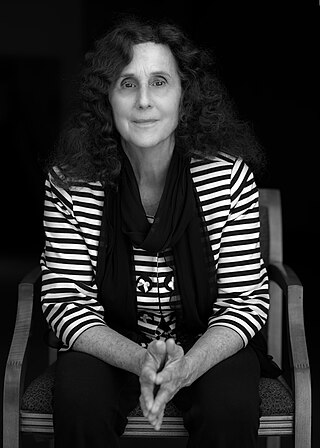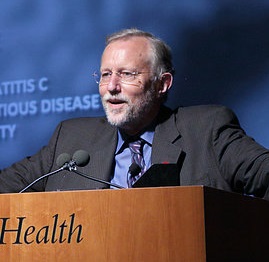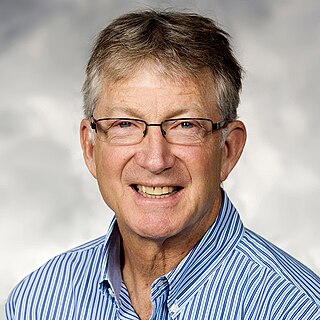Related Research Articles

Pamela Jane Bjorkman NAS, AAAS is an American biochemist and molecular biologist. She is the David Baltimore Professor of Biology and Biological Engineering at the California Institute of Technology (Caltech). Her research centers on the study of the three-dimensional structures of proteins related to Class I MHC, or Major Histocompatibility Complex, proteins of the immune system, and proteins involved in the immune responses to viruses. Bjorkman's goal is to improve current therapeutic applications. Bjorkman is most well known as a pioneer in the field of structural biology.

William Esco Moerner, also known as W. E. Moerner, is an American physical chemist and chemical physicist with current work in the biophysics and imaging of single molecules. He is credited with achieving the first optical detection and spectroscopy of a single molecule in condensed phases, along with his postdoc, Lothar Kador. Optical study of single molecules has subsequently become a widely used single-molecule experiment in chemistry, physics and biology. In 2014, he was awarded the Nobel Prize in Chemistry.

John Kuriyan is the dean of basic sciences and a professor of biochemistry at Vanderbilt University School of Medicine. He was formerly the Chancellor's Professor at the University of California, Berkeley in the departments of molecular and cell biology (MCB) and chemistry, a faculty scientist in Berkeley Lab's physical biosciences division, and a Howard Hughes Medical Institute investigator. He is a member of the National Academy of Sciences and he has also been on the Life Sciences jury for the Infosys Prize in 2009, 2019 and 2020.

Galen D. Stucky is an American inorganic materials chemist who is a Distinguished Professor and the Essam Khashoggi Chair In Materials Chemistry at the University of California, Santa Barbara. He is noted for his work with porous ordered mesoporous materials such as SBA-15. He won the Prince of Asturias Award in 2014, in the Scientific and Technological Research area. Stucky was elected a member of the American Association for the Advancement of Science in 1994, a member of the American Academy of Arts and Sciences in 2005, and a member of the National Academy of Sciences in 2013.
Harden M. McConnell was an American physical chemist. His many awards included the National Medal of Science and the Wolf Prize, and he was elected to the National Academy of Science."
Christopher T. Walsh was a Hamilton Kuhn professor of biological chemistry and pharmacology at Harvard Medical School. His research focused on enzymes and enzyme inhibition, and most recently focused on the problem of antibiotic resistance. He was elected to the National Academy of Sciences in 1989.
Satyajit Mayor (born 1963) is an Indian biologist. He serves as director of the National Centre for Biological Sciences, Bangalore. Mayor is the former director of the Institute for Stem Cell Biology and Regenerative Medicine (inStem) at Bangalore, which has a focus on the study of stem cell and regenerative biology.
Chaitan Khosla is an Indian-born American biochemist who is the Wells H. Rauser and Harold M. Petiprin Professor of Chemical Engineering and Chemistry at Stanford University. He earned his B.Tech. in chemical engineering from Indian Institute of Technology Bombay in 1985 and his Ph.D. from the California Institute of Technology in 1990 with Jay Bailey working on the expression of the Vitreoscilla Hemoglobin gene. He did his postdoctoral work at the John Innes Centre with David Hopwood. He has been a professor at Stanford since 1992 and was the chair of the program. His research is focused on two realms, the first are to build a molecular understanding of polyketide synthases and the second is focused on the biochemistry of celiac disease particularly involving tissue transglutaminase. His group play a large role in identifying the role of the α2-gliadin fragment in immune responses.
Jeffrey Victor Ravetch is a professor and head of the Laboratory of Molecular Genetics and Immunology at The Rockefeller University.

Juan J. de Pablo is a chemical engineer, Liew Family professor in the Pritzker School of Molecular Engineering at the University of Chicago and senior scientist at Argonne National Laboratory. In 2018, he was appointed Vice President for National Laboratories at the University of Chicago, a title which later expanded to include Science Strategy, Innovation and Global Initiatives in 2020. As of 2021, he is Executive Vice President for Science, Innovation, National Laboratories and Global Initiatives at the University of Chicago. He is known for his research on the thermophysical properties of soft materials. He is currently the co-director of the NIST supported Center for Hierarchical Materials Design (CHIMaD). and former director of the UW-Madison Materials Research Science and Engineering Center (MRSEC). He was elected a member of the National Academy of Sciences in 2022.

Charles Moen Rice is an American virologist and Nobel Prize laureate whose main area of research is the hepatitis C virus. He is a professor of virology at the Rockefeller University in New York City and an adjunct professor at Cornell University and Washington University School of Medicine. At the time of the award he was a faculty at Rockefeller.
Ashish Kishore Lele is an Indian chemical engineer, rheologist and the Director of the National Chemical Laboratory, Pune. He is known for his researches on micro and mesostructure of polymers and is an elected fellow of the Indian Academy of Sciences, and the Indian National Academy of Engineering. The Council of Scientific and Industrial Research, the apex agency of the Government of India for scientific research, awarded him the Shanti Swarup Bhatnagar Prize for Science and Technology, one of the highest Indian science awards for his contributions to Engineering Sciences in 2006. He received the Infosys Prize in 2012.
Stacey Bent is a professor of chemical engineering and vice provost for graduate education and postdoctoral affairs (VPGE) at Stanford University. She is the Jagdeep and Roshni Singh Professor of Engineering, the Bert and Candace Forbes University Fellow in Undergraduate Education, and a member of the National Academy of Engineering. She was the director of the TomKat Center for Sustainable Energy and a senior associate dean in the Stanford School of Engineering until 2019. She is best known for contributions to semiconductor processing, materials chemistry, and surface science. Her work has been applied toward applications in semiconductors, solar cells, and catalysts.

David Tse is the Thomas Kailath and Guanghan Xu Professor of Engineering at Stanford University.
Mark W. Grinstaff is the William Fairfield Warren Distinguished Professor and a Professor of Biomedical Engineering, Chemistry, Materials Science and Engineering and Medicine, at Boston University, Director of the National Institutes of Health's T32 Program in Translational Research in Biomaterials and Director of Nanotechnology Innovation Center. Grinstaff is an avid mentor and teacher who is always asking questions. In the laboratory, he has developed new paradigms for translating rigorous, academic work, which promotes intellectual progress, economic growth, and improved clinical outcomes. His career is marked by exploration of new areas and reinvention, and his discoveries have and continue to significantly impact multiple research areas. He is a co-founder of several companies and a co-inventor of several regulatory approved drug and device products used in the clinic today.
Agata Smogorzewska is a Polish-born scientist. She is an associate professor at Rockefeller University, heading the Laboratory of Genome Maintenance. Her work primarily focuses on DNA interstrand crosslink repair and the diseases resulting from deficiencies in this repair pathway, including Fanconi anemia and karyomegalic interstitial nephritis.

James L. Skinner is an American theoretical chemist. He is the Joseph O. and Elizabeth S. Hirschfelder Professor Emeritus at the University Wisconsin-Madison. He is also a member of the Scientific Advisory Board of the Welch Foundation. Most recently, Skinner was the Crown Family Professor of Molecular Engineering, professor of chemistry, director of the Water Research Initiative and deputy dean for faculty affairs of the Pritzker School of Molecular Engineering at the University of Chicago. Skinner is recognized for his contributions to the fields of theoretical chemistry, nonequilibrium statistical mechanics, linear and nonlinear spectroscopy of liquids, amorphous and crystalline solids, surfaces, proteins, and supercritical fluids. Skinner is the co-author of over 230 peer-reviewed research articles.
Gustavo A. Stolovitzky is an Argentine-American computational systems biologist. He was the CSO of Sema4 and then of GeneDx until December 2023. Between 1998 and 2021 he was a researcher and executive at IBM Research. At IBM he served in several roles including Founding Chair of the Exploratory Life Sciences Council and Director of the Translational Systems Biology and Nano-Biotechnology Program at IBM Research. From 2013 to 2018 he was Adjunct professor of Genetics and Genomic Sciences at the Icahn School of Medicine at Mount Sinai and from 2007 he has been an Adjunct Associate Professor of Biomedical Informatics at Columbia University. His research has been cited more than 29,000 times
Judy Lieberman is a professor of pediatrics at Harvard Medical School and holds an endowed chair in cellular and molecular medicine at Boston Children's Hospital.
Joanna Wysocka is a biologist, a professor at Stanford University, and a Howard Hughes Medical Institute Investigator. She specializes in chemical and systems biology as well as developmental biology.
References
- 1 2 "Seth A. Darst, Ph.D." The Rockefeller University. Retrieved 13 May 2018.
- 1 2 "Seth Darst joins National Academy of Sciences". The Rockefeller University. May 6, 2008. Retrieved 17 February 2013.
- ↑ "2004 Sigman Symposium:RNA Polymerase: A Magnificent Molecular Machine" (PDF). UCLA. Retrieved 17 February 2013.
- 1 2 "Seth A. Darst, Ph.D." The Pew Charitable Trusts. Archived from the original on 31 December 2013. Retrieved 17 February 2013.
- ↑ "Seth A. Darst". Member Directory. National Academy of Sciences. Retrieved 17 February 2013.